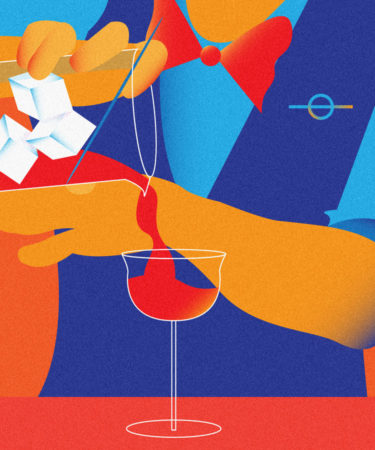“Bartenders are surrounded by alcohol, but we rarely talk about that as putting ourselves in a risky situation,” says Mark Goodwin. “For some of us, it really is.”
The San Francisco-based bartender and founder of The Pin Project has been sober for 10 months and counting. Before working in a bar, however, Goodwin was never a big drinker. In fact, during his Massachusetts college days he would happily volunteer as the designated driver among his group of friends.
After moving west to San Francisco to “make it big” with his band, Goodwin started bar-backing a few nights a week. The part-time job evolved into a passion and a career, and surrounded him with alcohol. He struggled to cope with day-to-day temptations.
To help drop “unhealthy drinking habits,” Goodwin came up with The Pin Project. The concept is simple: Bartenders wear the pin to communicate to colleagues and patrons that they’re making the choice not to drink alcohol that day. “It’s not a sobriety token,” he says. Instead, the pin is a societal tool, a non-verbal form of communication to “let the people around you know that you’re making a choice not to imbibe that shift.”
And it’s the “shift by shift” aspect of the pin he says is so important.
There could be any number of reasons someone chooses not to drink alcohol, he says, and sobriety is just one of them. “You could be on antibiotics, or you might have to pick someone up from the airport,” he says, “or maybe you have a substance problem.”
Whatever the reason, when working behind the bar, there’s never an easy way to explain that you don’t want to drink, “especially when your colleague in the well next to you is pouring shots because their friends just came in.” The pin allows those wearing it to make a statement that requires no explanation.
In July 2018, Goodwin received news that The Pin Project was one of 11 initiatives receiving a grant from the Tales of the Cocktail Foundation. “Whether it’s just a night off, or many nights off, we hope The Pin Project helps bartenders (and patrons alike) remove the stigmas around not drinking,” Caroline Rosen, executive director of the Tales of the Cocktail Foundation, writes VinePair in an email.
Goodwin was encouraged to apply for the Tales grant by Josh Harris, co-founder of Bon Vivants. The hospitality group owns the bar Trick Dog, where Goodwin got his start.
Harris has been sober for over 15 years and says the most important part of the project is the community it will build. The temporary nature of a wearable pin is important because sobriety is different for everyone. “You could put the pin on and wear it forever,” he says. “But what’s really important is that it’s now.”
The Pin Project will officially debut at this year’s Tales of the Cocktail in July. “This has to be taken seriously from the get-go for it to work,” Goodwin says. To reduce the risk of someone putting on a pin at the launch party and then — unintentionally or not — consuming alcohol, the launch event will be completely alcohol-free.
Goodwin will roll out the project in the Bay Area. By sharing with industry colleagues he knows will respect it and take it seriously, it should help “establish the sanctity” of putting on the pin, he says, then adds, “Not in a cult-ish way.” And then, slowly but surely, the plan is to introduce the pin to Chicago, New York, Los Angeles, and beyond.
Pins will retail online for $15. The price will cover the cost and shipping of the pin, and more than half of all proceeds will be donated to the Pin Foundation, a non-profit organization that will fund therapy and counseling for Bay Area service industry professionals. The model will be scalable and, in the future, Goodwin plans to sponsor additional mental health charities.
Feedback has already been incredible, Goodwin says. “I’m really honored and humbled to see people taking interest in this little idea that started over a couple of hungover breakfasts,” he says. But make no doubt about it: “There’s a lot of work left to do.”
